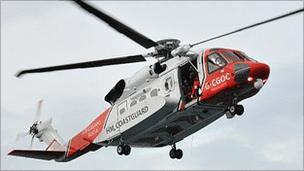Coastguard stations set to be slashed
- Published

The government believes the changes will "strengthen the coastguard service"
Ten of the UK's 18 round-the-clock coastguard centres are due to close as part of planned cuts to the service.
Five remaining sites will operate just during daylight, with the only 24-hour centres planned for Aberdeen, Dover and the Southampton/Portsmouth area.
The government hopes to "improve levels of service while reducing costs", and said the current set-up dated back 40 years and "cannot stand still".
The cuts raise concerns about safety around the UK's coastline, says Labour.
There are currently 18 round-the-clock Maritime Rescue Co-ordination Centres (MRCC), grouped into nine pairs, as well as a smaller London centre covering the Thames that is not staffed 24 hours a day.
Replacing these will be the three 24-hour centres and five sub-centres open only during daylight hours in Swansea, Falmouth in Cornwall, Humber, either Belfast or Liverpool, and either Stornoway or Shetland. The London centre will be unaffected by the changes.
A 14-week consultation on the proposals has been launched.
Shipping Minister Mike Penning said the Aberdeen and Southampton/Portsmouth centres would be "maritime operations centres capable of managing maritime incidents wherever and whenever they occur and with improved information systems, together with a 24-hour centre at Dover looking over the busy channel traffic separation scheme".
'Lack of co-ordination'
The five sub-centres would be "fully integrated into the national network", he said.
"Our seas are becoming busier, with larger ships and increasing numbers of offshore renewable energy platforms making key areas of our seas more congested," the minister said.
"There are also increasing numbers of people using our beaches, coastlines and seas for leisure activities.
"The current organisation of the coastguard - which dates back some 40 years - is not well placed to respond to these challenges.
"The lack of national co-ordination between the centres can result in limited resilience and an uneven distribution of the workload, especially during busy periods."
But shadow transport minister Jim Fitzpatrick said: "There are real fears about the ability of such a reduced service to respond to incidents in good time and the loss of local knowledge can only hinder search and rescue operations.
"The government must now come clean on the estimates they must have made of the increased length of time to reach maritime incidents as a result of these closures."
Ageing helicopters
Meanwhile, the government has postponed an announcement about the sell-off of the UK's search and rescue helicopters.
It said a "possible issue" had arisen with a foreign consortium's bid to take over running the fleet from the RAF.
Transport Secretary Philip Hammond said there would be a statement to the House of Commons "as soon as we are able to provide further information and to set out our plans for proceeding to secure the provision of search and rescue helicopter capability in the future".
"We regret the further uncertainty that this entails for all those involved in providing the UK's search and rescue service," he added.
The service is currently provided by the RAF and Royal Navy, plus civilian helicopters through the Maritime and Coastguard Agency.
A French-American consortium is the preferred bidder to take over running the operation.
The contract is worth £6bn over 25 years and will see the number of military aircrew reduced from 240 to 66, with civilian aircrew making up the shortfall.
The ageing Sea King helicopter fleet is expected to be replaced by American Sikorskys.
Prince William is currently based at the RAF's search and rescue headquarters at Valley on Anglesey.
- Published16 December 2010
- Published16 December 2010
- Published16 December 2010
- Published16 December 2010
- Published5 October 2010